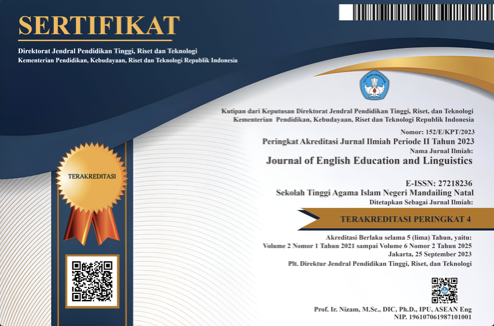The Shift of Addressing Terms of Mandailingnese Society in Panyabungan
DOI:
https://doi.org/10.56874/jeel.v1i1.42Abstract
This study deals with the shift of addressing term of Mandailingnese society in Panyabungan. It employs qualitative research design with a case study. This study aims to describe: (1) the types of shift occur in the use of addressing terms by Mandailingnese speaker in Panyabungan, (2) the pattern of the shift of addressing term and (3) Reasons of Mandailingnese shift the addressing term in Panyabungan. The subjects were 20 respondent from second generation of parents group. The instruments used in this study were questionnaire and interview. The data was analyzed by Miles and Hubermans’ data analysis. There are fourteen respondent (70%) shif completely the addressing term in core family, two respondent (10%) shift partly the addressing term and four respondent (20%) maintain the addressing term. The shift of ddressing terms cover three types; ten respondents (50%) do not participate actively in the life of minority language, three respondents (15%) are not fluent in Mandailing language and seven respondents (35%) those are influenced by their parents to shift the addressing term. There are five patterns of the shift of addressing terms and three reasons why Mandailingnese society shift the addressing term; status of Indonesian language, social success and family tradition.
Keyword : shift, addressing term, mandailingnese society
References
Afful, Joseph B.A. 2006. Address terms among university students in Ghana. A Case Study”. Journal of Language and Intercultural Communication 6/1:7691.
Bogdan, R.C. & Biklen, S.K. 1992. Qualitative Research for Education: Introduction to Theory and Method. Boston: Allyn and Bacon.
Chaika, Elaine. 1982. Language The Social Mirror. London: Newbury House Publisher Inc. Cooklin, N.F & Margareth, A.L. 1983. Multilingualism and Language change. London: The
Free Press Collier McMillan.
Cooper. R.L. 1989. Language planning and Social Change. Cambridge: Cambridge
University Press.
Duranti, Alessandro. Linguistic Anthropology. Cambridge: Cambridge University Press. Fasold, Ralph. 1984. The Sociolinguistics of Society. New York: Blackwell.
Fishman, J.A. 1968. Reading in the Sociology of Language. Den Haag-Paris :Mouton. Fishman, J.A. 1972. The Sociology of Language. Newbury : Rowley.
Holmes, Janet. 1992. An Introduction to Sociolinguistics. London: Longman.
Hymes, Dell. 1974. Foundation in Sociolinguistics. Pennsylvania: University of Pennsilvania. Nasution, H. Pandapotan, 2005. Adat Budaya Mandailing dalam Tantangan Zaman, Medan:
Forkala SU.
Romaine, S. 1995. Language in Society. Oxford University Press.
Schmid. M.S.2004. First Language Attrition: Interdisciplinary Perspective on
Methodological Issues. Amsterdam: Benjamins.
Scotton. 2006. Multiple Voices An Introduction to Bilingualism: Blackwell Publishing. Wardhaugh, R. 1972. Introduction to Linguistics. New York: Mc Graw Hill Books Company. Weinrich, Uriel. 1968. Language in Contact. The Hauge-Paris: Mouton.
Oyetade. 1995. “A Sociolinguistic analysis of address forms in Yoruba”. Language in
Society. Cambridge University Press.
Zhang. 2008. Between Two generations: Language Maintenance and Aculturation Among
Chinese Immigrant Families. Scholarly Publishing.
Downloads
Published
Issue
Section
License
All articles published in the Journal of English Education and Linguistics are licensed under a Creative Commons Attribution-ShareAlike 4.0 International (CC BY-SA) license. This means anyone is free to copy, transform, or redistribute articles for any lawful purpose in any medium, provided they give appropriate attribution to the original author(s) and Journal of English Education and Linguistics, link to the license, indicate if changes were made, and redistribute any derivative work under the same license.
Copyright on articles is retained by the respective author(s) without restrictions. A non-exclusive license is granted to the Journal of English Education and Linguistics to publish the article and identify itself as its original publisher, along with the commercial right to include the article in a hardcopy issue for sale to libraries and individuals.
Although the conditions of the Creative Commons Attribution-ShareAlike 4.0 International (CC BY-SA) license do not apply to authors (as the copyright holder of your article, you have no restrictions on your rights), by submitting to the Journal of English Education and Linguistics, authors recognize the rights of readers and must grant any third party the right to use their articles to the extent provided by the license.

This work is licensed under a Creative Commons Attribution-ShareAlike 4.0 International License.








